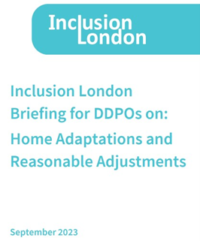Briefing for DDPOs on Home Adaptations and Reasonable Adjustments
Briefing for Deaf and Disabled People’s Organisations (DDPO’s) on home adaptations and reasonable adjustments

As Deaf and Disabled tenants, we often face accessibility barriers in our homes that prevent us from living independently. These barriers might be physical such as stairs for someone with a mobility impairment or a doorbell for a Deaf person. They can also non-physical such as communication barriers with landlords. The purpose of home adaptations is to change a home to remove these barriers and promote equality for Deaf and Disabled people. This can be done by asking for a reasonable adjustment to the home.
Reasonable adjustments also might mean asking the landlord to change the way they do things to make them more accessible. For example, not forcing tenants to come to morning appointments if their impairment prevents them from doing so.
This briefing will provide Deaf and Disabled People’s Organisations (DDPO’s) with an understanding of what reasonable adjustments are, what Disabled tenant’s rights are when it comes adaptations in their home and some of the issues that Disabled tenants face when asking for reasonable adaptations. This will be outlined by explaining:
- The Equality Act 2010 and how it is relevant to reasonable adjustments for Deaf and Disabled people
- What reasonable adjustments are
- How to apply for a Disabled Facilities Grant (DFG)
- What the issues around DFGs are
Links to the briefing:
Reasonable Adjustments Briefing Word version
Reasonable Adjustments Briefing PDF version
Easy Read Versions

Credit to Photosymbols